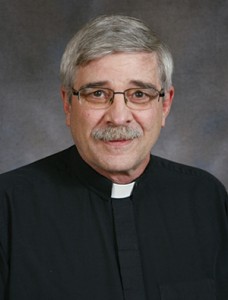From the President – Present in the Holy Word
By: Timothy Teuscher

Rev. Timothy Teuscher
2019 marks the 500th Anniversary of the Leipzig Debate which was held in the summer of 1519. At that time, Martin Luther met with the Roman theologian, Johann Eck, to debate issues surrounding indulgences, purgatory, and penance, subjects first raised as a result of Luther’s 95 Theses published two years earlier.
Discussion soon turned instead to the question of authority in the church. Near the end of the debate, Luther asserted something that was rather controversial in those days—namely, that popes, councils, and theologians were all subject to errors and mistakes, and that Holy Scripture was the supreme authority in all theological matters.
What Luther stated at Leipzig in 1519 would later be set forth in the Formula of Concord even more explicitly and clearly: “We believe, teach, and confess that the only rule and norm according to which all teachings, together with all teachers, should be evaluated and judged (2 Timothy 3:15-17) are the prophetic and apostolic Scriptures of the Old and New Testament alone” (FC Ep, Rule and Norm, 1).
But the Holy Scriptures are not merely the sole authority for faith, teaching, and life; they are also efficacious. While we don’t use the word ‘efficacy’ much anymore, it was used frequently in former days to express the truth that the Holy Scriptures do something, that they effect something. So we read in the Large Catechism: “The Word is so effective that whenever it is seriously contemplated, heard, and used, it is bound never to be without fruit (Isaiah 53:11; Mark 4:20). It always awakens new understanding, pleasure, and devoutness and produces a pure heart and pure thoughts (Philippians 4:8). For these words are not lazy or dead, but are creative, living words (Hebrews 4:12)” (LC, Part I, 101).
How are we cleansed of our sins? Jesus Himself answers: “Already you are clean because of the word that I have spoken to you” (John 15:3). How are we saved from sin and death? St. Paul answers: “You have been acquainted with the sacred writings, which are able to make you wise for salvation through faith in Christ Jesus” (2 Timothy 3:15). How do we come to saving faith in Christ? St. John answers: “These are written so that you may believe that Jesus is the Christ, the Son of God, and that by believing you may have life in his name” (John 20:3).
The season of the church year called Epiphany is about the revealing, the manifesting, the making known of Jesus as true God and the Saviour of all people. And where is Jesus? How is He revealed and made known to us today? Yes, in and through the Holy Scriptures.
We see an example of this in the wise men who came to worship the newborn King of the Jews. But there is something in this familiar account that is often overlooked. The star that they saw in the East did not lead those wise men directly to Jesus. Instead, they go first to Jerusalem where this newborn King and Savior was not to be found. And why? Well, remember what happened there in Jerusalem when the wise men arrived: “When Herod the king heard this, he assembled all the chief priests and scribes of the people, and inquired of them where the Christ was to be born. They told him, ‘In Bethlehem of Judea, for so it is written by the prophet: And you, O Bethlehem, in the land of Judah, are by no means least among the rulers of Judah; for from you shall come a ruler who will shepherd my people Israel'” (Matthew 2:3-6).
Do you see what is going on here? The star led the wise men first to the Word of God, and only then to the Christ Child. God did this, as Luther put it, “to teach us to cling to the Scriptures alone and not rely upon our own ideas or opinions, feelings or experiences. For it is in His Word and nowhere else that He permits Himself to be found.”
In the midst of transitions in our synodical structure, in the midst of transition and change in our congregations, let us not forget what is to be our chief concern, the heart and center of all that goes on both in our synod as a whole or in our individual congregations—namely, the revealing, manifesting, and making known of Jesus by and in and through His Word: the hearing, teaching, studying, proclaiming, and singing of that Word.
May, therefore, the prayer from the Epiphany hymn be in our minds, on our lips, and in our hearts often throughout this year of 2019:
“Grant us grace to see Thee, Lord, Present in Thy holy Word—
Grace to imitate Thee now And be pure, as pure art Thou;
That we might become like Thee At Thy great epiphany
And may praise Thee, ever blest, God in man made manifest.” – (LSB 394:4)





